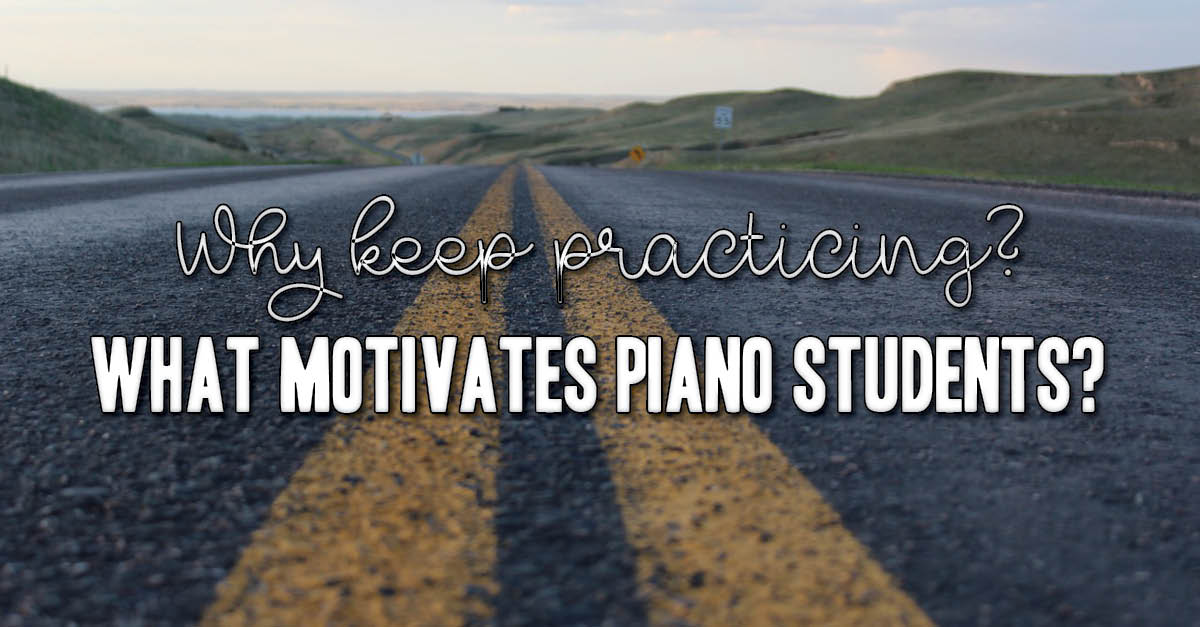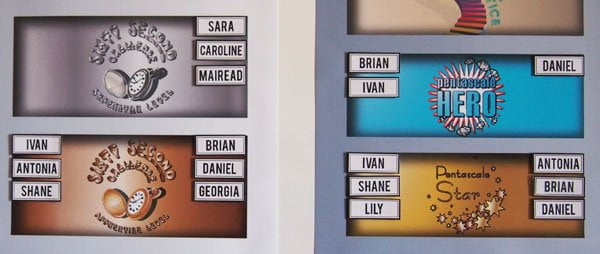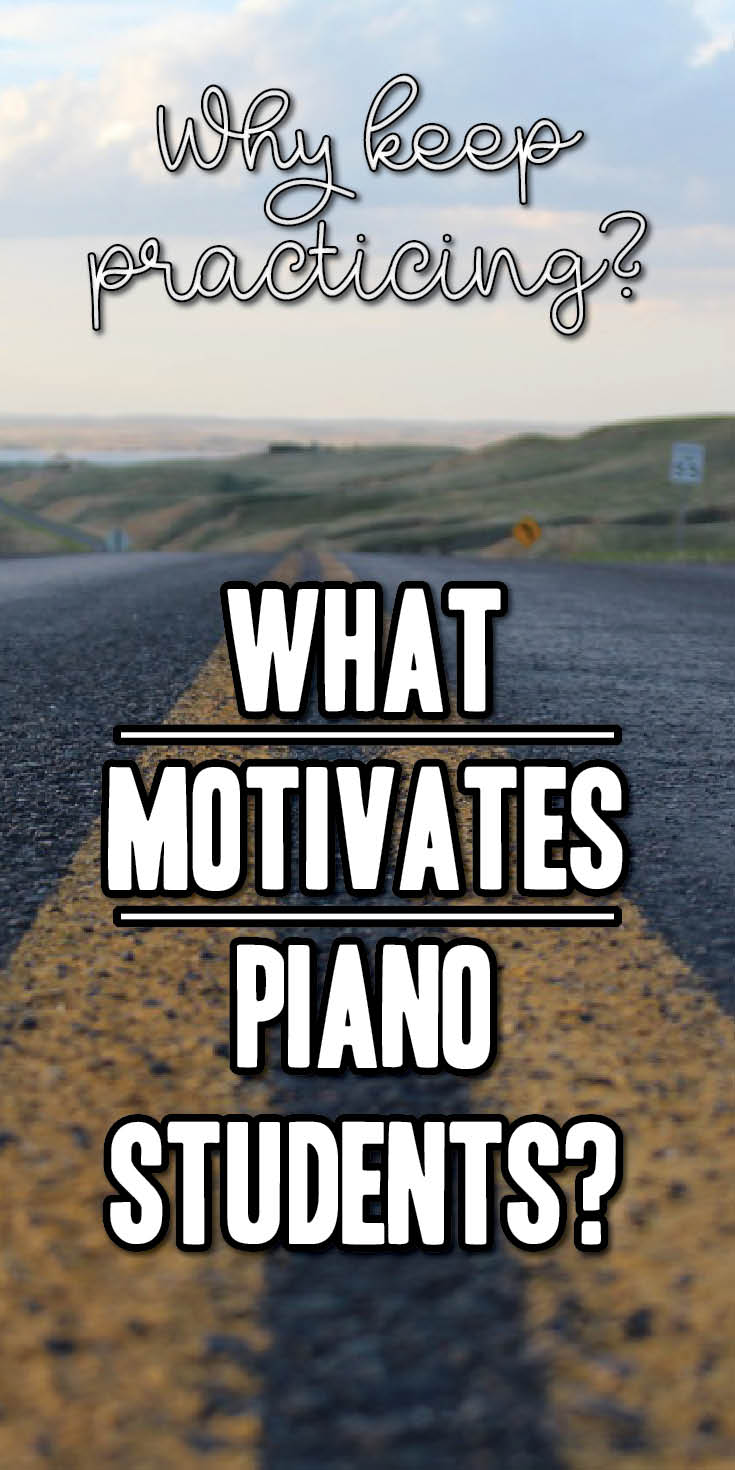Learning to play piano is a hard task. It takes (and breeds) grit and determination.
In order to better serve our students, I think it’s helpful to understand why students continue. This can help us to prevent the flip-side, why some students quit.

Below are what I think are the top six ways to motivate piano students to practice piano. Of course there are probably many more types of motivation. Once you’ve read my thoughts – be sure to leave your motivating ideas in the comments.
1. Fear
The ruler over the back of the hand is an image brought up all to often in relation to piano teaching. Although I would hope that no piano teachers are still using corporal punishment, fear is still a factor in many studios.

Even if it’s just fear of being given out to, or teacher disappointment, fear can be a constant presence for some students.
It probably won’t surprise you to know that this is not my preferred method to motivate piano students. In fact it’s not on my list at all. It might work in the short/medium term, but it creates a negative association for students.
If piano lessons are a negative experience then sooner or later students are going to remove that negativity from their life. They’re going to quit.
2. Incentives
Now that the ugly option is out of the way, we’re on to the fun motivators. 🙂
Many teachers use different types of incentive programs to help their students to reach their potential. Whether it’s a year round prize box (Joy Morin shares a good example on her blog here), or one-off incentives leading up to a special occasion or event.

Incentive programs can be a good way to keep students going. Of course we all want students with internal motivation – but learning music is hard work and they might just need a little help getting there.
3. Praise
A simple way to motivate piano students, and probably the most essential component of good instruction. Genuine, heartfelt and enthusiastic praise from a trusted adult is often the best reward for a child.
If you have a good relationship and rapport with your students a kind word from you can go a long way.
Good praise must be:
- True
- Specific
- Enthusiastic
These three elements are essential for the praise to stick. If you say…
“Very good.”
You might as well say nothing at all. Students will assume that’s just a verbal tick. Just something you say for the sake of speaking. How about…
“I loved that! It was wonderful!”
This is better, at least you’re being enthusiastic, and maybe it was true. It won’t stick nearly as well as something specific though, like:
“I loved your use of dynamics there, that’s a big improvement from last week.”
“Your note reading has improved so much this term! Do you remember when you could only read a few notes around middle C?”
“Wow, the rhythm there was bang on. That metronome practice really paid off!”
The more of this type of praise a student receives, the more they’ll start thinking this way between lessons too. They’ll go home not only glowing about their accomplishments last week – but looking forward to what they can improve for next week’s lesson.
4. Achievement
One tip (of many!) that I picked up from Coffee with Ray by Nick Ambrosino is to point out this feeling to students. Don’t just hope he takes note of it, but explicitly mention it so he can revel in it. This way he’s more likely to chase it next time.
“Amazing! You put in the hard work and you got that Grade 5 Distinction you wanted. Look how great that feels right now, you should be so proud of yourself.”

Achievements could be more structured, such as exams or competitions but they might also just be personal goals. Make sure you celebrate all of these achievements, big and small.
- Finishing a book
- Completing a set of scales or exercises
- Passing an exam
- Performing in a recital
- Participating in a competition
- Memorising a piece they love
- Reaching the middle of a book (yes really!)
- Anything else you think your student couldn’t do and now can
5. Personal Growth
Do I hear you laughing? Are you thinking “Yeah right, ’cause an eight year old is going to learn just to grow!“?
No, probably not really. But his parents might have this motivation. And many adult students certainly learn primarily for this reason.

Many parents do encourage their kids to start an instrument because they know it’s good for them. They know how much it improves general cognition, grit and self-belief. Learning to play an instrument is hard work sometimes for the whole family, so it’s important to understand this motivation too.
6. Social
The peer factor reaches it’s peak in the teen years. What your friends think is cool gets more and more important as kids grow into teenagers, and then gradually less important into young adulthood.

This is the reason I’m a big advocate for repertoire in varied genres, and opportunities for group music making. Teens especially need to learn some things that they can play for their peers.
Pop, rock, and jazzy styles are cool to play at a party. Mozart isn’t….
…well maybe Rondo Alla Turca. Maybe.
If you can get a group of students playing together that’s an even greater social motivator. When you know you’re going to be playing a trio with two other students you’re going to practice. You can’t let the side down and you don’t want to be embarrassed by being the only unprepared one.
More Actionable Piano Practice Tips
Do you need more specifics on how students should practice and how to get parents involved? Then you’ll love this post on What I Wish I Knew About Teaching Piano Practice 12 Years Ago.
So, let’s hear your ideas to motivate piano students!
What do you think are your students’ primary motivators? What would you like to be driving them forward?
How have you tried to motivate piano students in the past?

I appreciate this information about the ways to motivate piano students to keep practicing. I like what was said about the importance of giving appropriate praise. I agree that praise must be true, specific, and enthusiastic. Something to consider would be to find a teacher who offers this kind of constructive help for a price within your budget.
I’ve been we experimenting with small “report cards” after each lesson titled
D
I’ve been trying “report cards, ” after each lesson titled How Was This Lesson? There are 9 areas to grade a score.from 1-5.,p!us an additional 5 points on the tried hard column ( extra hard ), making 50pts possible. After 200 pts, they get a small prize. I explain each score to them. It’s immediate accountability and good explanation for parents. They seem to understand better what is expected and important.
I
Love this idea